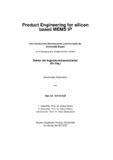Citation link:
https://nbn-resolving.org/urn:nbn:de:hbz:467-2287| DC Field | Value | Language |
|---|---|---|
| dc.contributor.author | Ortloff, Dirk | - |
| dc.date.accessioned | 2019-09-02T09:56:04Z | - |
| dc.date.available | 2006-08-24T12:12:12Z | - |
| dc.date.available | 2019-09-02T09:56:04Z | - |
| dc.date.issued | 2006 | - |
| dc.description.abstract | Today the silicon based Micro Electro-Mechanical Systems (MEMS) industry has inadequate development methodologies and frameworks. This is especially true when developing MEMS process and design Intellectual Property (IP). The existing development methods and frameworks are not accommodating for the necessary areas and components required for efficient, reproducible and controlled MEMS IP development. As such issues have not been addressed, this results in e.g. unresolved development methodology questions and non-systematic storage of product deliverables. This thesis proposes a systematic development approach to tackle several of such insufficiencies. It proposes a novel MEMS IP development methodology guiding the developments from a product idea to a marketable product. Because the business processes of the method require tool support, a quality integrated Product Engineering Framework is proposed supporting the key areas. The thesis describes a new framework concept of business process components supporting the methodology and establishes processes guiding through the development efforts. A major focus is set on the in-depth research of reproducibility and control aspects of the process IP development efforts. The findings concerning process development tracking are converted into novel concepts for supporting tools and the newly implemented software environment to address the found problem areas is introduced. The thesis presents results generated during the EU FP6 project PROMENADE [Eur04] and previous works. The software environment developed by the PROMENADE project builds a major cornerstone of a company wide framework for developing silicon based MEMS IP modules. | en |
| dc.description.abstract | Die Industrie für siliziumbasierte Mikrosysteme hat heute keine adäquaten Entwicklungsmethoden und -umgebungen. Dies gilt speziell für Firmen, die ein wissensbasiertes Geschäftsmodell (Intellectual Property, IP) verfolgen. Die existierenden Methoden und Umgebungen unterstützen nicht alle erforderlichen Bereiche und bieten nicht alle notwendigen Komponenten für die Mikrosystementwicklung. Diese unzureichende Unterstützung führt, unter anderem, zu unvollständigen und nicht reproduzierbaren Entwicklungsflüssen. Dies ist vor allem auf die unsystematische Speicherung der Entwicklungs- und Produktergebnissen zurückzuführen. Diese Doktorarbeit stellt einen systematischen Entwicklungsansatz vor, der mehrere dieser Probleme bearbeitet. Hierzu werden alle relevanten Aspekte analysiert und exemplarische Lösungsvorschläge aufgezeigt. Es wird eine neue Methodik bereitgestellt, welche von der Idee bis zum vermarktbaren, wissensbasierten Mikrosystemprodukt führt. Hierzu wird eine Umgebung aus Geschäftsprozessen und Unterstützungswerkzeugen für die Methodik beschrieben. Ein besonderes Augenmerk wird auf die detaillierte Analyse von Reproduzierbarkeits- und Kontrollaspekten der Fertigungsprozessentwicklung gelegt. Die Ergebnisse wurden zur Entwicklung neuer Konzepte und Werkzeuge zur Entwicklungsunterstützung in der Praxis eingesetzt. Die Arbeit präsentiert Ergebnisse aus dem von der EU geförderten Projekt PROMENADE [Eur04] und des Vorläuferprototypen PDTS. Die innerhalb des Projektes entwickelte Softwareumgebung bildet einen Grundpfeiler für die firmenweite eingesetzte Entwicklungsumgebung. | de |
| dc.identifier.uri | https://dspace.ub.uni-siegen.de/handle/ubsi/228 | - |
| dc.identifier.urn | urn:nbn:de:hbz:467-2287 | - |
| dc.language.iso | en | en |
| dc.rights.uri | https://dspace.ub.uni-siegen.de/static/license.txt | de |
| dc.subject.ddc | 004 Informatik | de |
| dc.subject.other | Microsystems | en |
| dc.subject.other | Intellectual Property | en |
| dc.subject.other | Semiconductor IP | en |
| dc.title | Product engineering for silicon based MEMS IP | en |
| dc.type | Doctoral Thesis | de |
| item.fulltext | With Fulltext | - |
| ubsi.date.accepted | 2006-06-25 | - |
| ubsi.publication.affiliation | Fachbereich 12, Elektrotechnik und Informatik | de |
| ubsi.subject.ghbs | YFBA | - |
| ubsi.type.version | publishedVersion | de |
| Appears in Collections: | Hochschulschriften | |
Files in This Item:
| File | Description | Size | Format | |
|---|---|---|---|---|
| ortloff.pdf | 13.69 MB | Adobe PDF |  View/Open |
This item is protected by original copyright |
Page view(s)
311
checked on Apr 3, 2025
Download(s)
457
checked on Apr 3, 2025
Google ScholarTM
Check
Items in DSpace are protected by copyright, with all rights reserved, unless otherwise indicated.

